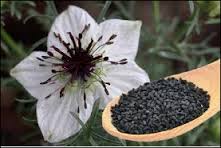Black Cumin
 Monday 22 August 2016
Monday 22 August 2016
Other Local Name : black-caraway, black-cumin, fennel-flower, nigella, nutmeg-flower, Roman-coriander, and kalonji (from Hindi)
Botanical Name : Nigella sativa
Family : Nigella
Main Use : Medicin/Food
Other Uses : The black cumin or Nigella sativa L. seeds acclaimed to have medicinal properties such as bronchodilatory, hypotensive, antibacterial, antifungal, analgesic, anti-inflammatory and immunopotentiating. The seeds of Nigella sativa Linn. (Ranunculaceae), commonly known as black seed or black cumin, are used in folk (herbal) medicine all over the world for the treatment and prevention of a number of diseases and conditions that include asthma, diarrhoea and dyslipidaemia. The seeds contain both fixed and essential oils, proteins, alkaloids and saponin. Much of the biological activity of the seeds has been shown to be due to thymoquinone, the major component of the essential oil, but which is also present in the fixed oil. The pharmacological actions of the crude extracts of the seeds (and some of its active constituents, e.g. volatile oil and thymoquinone) that have been reported include protection against nephrotoxicity and hepatotoxicity induced by either disease or chemicals. The seeds/oil have antiinflammatory, analgesic, antipyretic, antimicrobial and antineoplastic activity. The oil decreases blood pressure and increases respiration. Treatment of rats with the seed extract for up to 12 weeks has been reported to induce changes in the haemogram that include an increase in both the packed cell volume (PCV) and haemoglobin (Hb), and a decrease in plasma concentrations of cholesterol, triglycerides and glucose. The seeds are characterized by a very low degree of toxicity. Two cases of contact dermatitis in two individuals have been reported following topical use. Administration of either the seed extract or its oil has been shown not to induce significant adverse effects on liver or kidney functions. It would appear that the beneficial effects of the use of the seeds and thymoquinone might be related to their cytoprotective and antioxidant actions, and to their effect on some mediators of inflammation.The seeds of this herb are used in the Middle East and South Asian countries for the treatment of a large variety of ailments and are accepted as a panacea. For example, the seeds or oil from the seeds have been used to control diabetes, hypertension, cancer (leukeamia, liver, lung, kidney, prostate, breast, cervix, skin), inflammation, hepatic disorder, arthritis, kidney disorder, cardiovascular complications and dermatological conditions.
Know More
A GC–MS analysis of the seed extract has shown it to be a mixture of eight fatty acids and 32 volatile terpenes. The major terpenes, thymoquinone (TQ), dithymoquinone (DTQ), trans-anethol, p-cymene, limonine, and carvone have been identified (Nickavar et al. 2003). TQ and DTQ are both cytotoxic for various types of tumors. In addition diterpenes, triterpene and terpene alkaloids have been identified in N. sativa seeds. The methanolic extract of the seeds contain two types of alkaloids whilst the major principal active ingredient isolated from the volatile oil of N.sativa L. is TQ.
The isoquinoline alkaloids include nigellicimine (1) and nigellicimine-N-oxide (2), and the indazole alkaloids include nigellidine (3) and nigellicine (4). Several new dolabellane-type diterpene alkaloids, nigellamines A1–A5 (5 )
have also been isolated from the methanolic extract of the seeds of N. sativa L.
Boil is cured on application of black cumin oil mixed with sesame oil. Lactating mothers are served with powdered black cumin seed mixed with garlic for improvement of lactation. Intake of powdered black cumin mixed with hot boiled rice cures cold and fever.
Information from Field Research of UBINIG